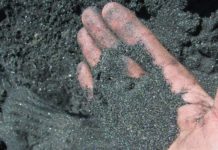
KUMBA Iron Ore CEO Mpumi Zikalala said she was convinced Transnet was turning the corner despite her company enduring another disappointing rail and ports performance in the six months ended June.
“For me the critical thing is Transnet is not holding back which we don’t take for granted,” Zikalala said in respect of attempts to improve transparency performance. “That has not always been the case, believe it or not,” she added.
Zikalala’s comments come ahead of results from an independent technical assessment this quarter. The assessment, commissioned by the Ore Users Forum – of which Kumba is part – and Transnet is aimed at fixing some of the deficiencies in rail and port opoerations. Kumba would “look to implement quick wins”, Zikalala said.
Transnet appointed new management last year including a CEO in Michelle Philiips, previously CEO of Transnet Pipelines. Nosipho Maphumulo, previously of Rotek Industries, was appointed CFO of Transnet.
The results of the assessment would be viewed at the same time by Transnet and the Ore Users Forum, said Zikalala, adding there was “no screening”. She considered this a critical change in private/public participation while the reform agenda of the recently formed Government of National Unity also heartened her.
It’s worth noting that export coal volumes in July picked up significantly in a more material sign that Transnet is improving performance.
Zikalala acknowledged that iron ore stock levels were “higher than we would like them to be” in the first half of the firm’s financial year. However, recent improvements at Transnet’s Saldanha port boded well for the remainder of the year.
Kumba, which is 70% owned by Anglo American, reported total finished stocks of 8.2 million tons (Mt) for the six months ended June. This compares to 7.1Mt end-December. On-mine stocks increased to 7.4Mt compared to 6.5Mt.
Stocks were at similar levels when in December Anglo CEO Duncan Wanblad announced Kumba would reduce production between 2024 and 2026, saying the company was stock bound.
“There was an improvement in the second quarter following Transnet’s mini-shut,” said Zikalala. “There are still some challenges on the rail side and the current focus is on improving that.” Sales guidance has been maintained at 36 to 38Mt for the 12 months ended December.
Zikalala was commenting at a media call following publication of Kumba’s interim results ended June in which basic earnings fell 26% to R22,27 per share.
Production was hauled in 2% to 18.5Mt in terms of Kumba’s strategy to match production against Transnet’s ability to rail and ship ore, but the main drivers to the performance were an 8% decline in the average iron ore price ($97 per wet metric ton), and 5% lower sales owing to Transnet’s capacity problems at Saldanha port, and poor weather.
Kumba, however, drives a strong margin – 44% Ebitda, generating R9.1bn in free cash – partly owing to good cost containment at mine level. At Kumba’s Sishen and Kolomela mines in the Northern Cape there was a 1% reduction in unit costs to $38.5/t, in line with guidance for the year of $38/t.
Total operating expenses rose 10% to R22.9bn. This was owing to higher freight costs and the effects of stock movement partly offset by high deferred waste stripping capitalised, said Kumba.
Some R1.8bn of a planned R2.5bn to R3bn in cost savings were achieved in the six months. As previously announced, ‘rightsizing’ at Kumba is underway affecting 490 roles and 160 service partners.
But for shareholders, the outcome of was – despite the reduction in sales and lower iron ore price – the declaration of an R18.77 per share interim dividend, equal to 85% of headline earnings.










